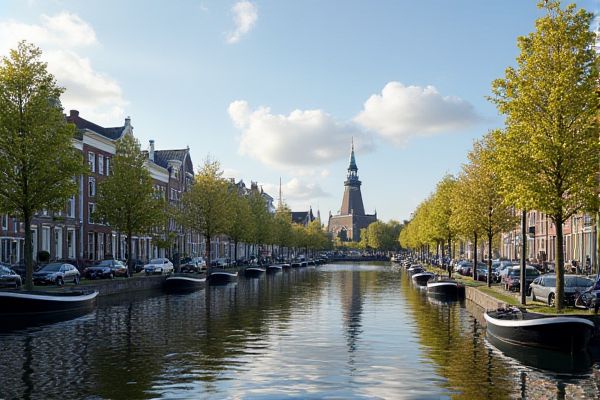
Healthcare facilities in Netherlands: Mandatory health insurance required. GP referrals needed for specialists. Dutch public healthcare system. Private healthcare options available. Healthcare premiums vary annually. Coverage includes standard care. Emergency services widely accessible. Pharmacies handle prescriptions. Mental health services offered. Expats register with local GP.
Mandatory health insurance required.
In the Netherlands, mandatory health insurance is required for all residents and workers, with everyone over 18 needing to purchase basic health insurance from a private insurer, while children under 18 are automatically covered by their parents' insurance. Insurers must accept all applicants and cannot refuse coverage or impose special conditions based on health or financial status. For more in-depth information, you can explore details about the Healthcare System in the Netherlands, which ensures comprehensive coverage and equitable access for everyone.
GP referrals needed for specialists.
In the Netherlands, seeing a specialist requires a referral from a General Practitioner (GP). If your health issues cannot be resolved by the GP, they will refer you to the appropriate specialist, and this referral is necessary for insurance coverage and to book an appointment with the specialist. For more detailed information, visit the Referral to Specialist page to understand the procedures and requirements involved in this process.
Dutch public healthcare system.
The Dutch public healthcare system is characterized by a universal, mandatory insurance model managed by private insurers but overseen by the government. It includes a network of acute primary care centers, general practice health centers, and emergency units, with hospitals categorized into University Hospitals, top-clinical teaching hospitals, and general hospitals, all of which provide comprehensive care with strict regulations against refusing coverage or imposing punitive fees. For more detailed information about this system, you can visit the page on Healthcare in the Netherlands.
Private healthcare options available.
In the Netherlands, private healthcare options include additional top-up insurance that covers services excluded from the basic health insurance package, such as dentistry, physical therapy, and vision care. This private insurance also offers a wider range of healthcare providers, shorter waiting times, and higher levels of comfort and privacy in hospitals and health clinics. For more information on this topic, visit the detailed guide on Healthcare In The Netherlands, which outlines the benefits of private healthcare options in this region.
Healthcare premiums vary annually.
In the Netherlands, healthcare premiums experience annual fluctuations, with the primary insurance premium anticipated to rise by about EUR10 per month in 2025. This increase will bring the total monthly cost to approximately EUR158.50. These adjustments are largely attributed to escalating healthcare costs, inflation, and a heightened demand for care. For more information on these changes, you can visit the changes in healthcare insurance webpage.
Coverage includes standard care.
In the Netherlands, the mandatory health insurance (Ziektekostenverzekering) covers a wide range of standard care services, including visits to General Practitioners (GPs), hospital care, and specialist treatments, with an annual deductible applied to most services except for GP visits and maternity care. For more detailed information on healthcare coverage, you can visit the website on Healthcare in the Netherlands. This comprehensive system ensures that residents have access to necessary healthcare services without financial strain, maintaining a high standard of public health.
Emergency services widely accessible.
In the Netherlands, emergency services are widely accessible through the 112 emergency number, with a network of 160 acute primary care centers and emergency rooms available 24/7, ensuring that 99.8% of the population can reach an emergency unit within 45 minutes. Additionally, a new 112NL app has been introduced to facilitate communication for people with speech and hearing impairments through text messaging and translation services.
Pharmacies handle prescriptions.
In the Netherlands, pharmacies, known locally as apotheek, offer convenience and accessibility by allowing patients to fill prescriptions at registered locations that can deliver medications directly to one’s home free of charge or provide secured pick-up boxes. These pharmacies often collaborate with health insurers, facilitating a system of direct billing for ease of transactions. Furthermore, pharmacists in the Netherlands have the authority to modify prescriptions to avert drug-related issues or logistical challenges, ensuring patient safety and well-being. For more detailed insights into the Dutch Healthcare System, you can refer to the Medicine & Pharmacies Netherlands page.
Mental health services offered.
In the Netherlands, mental health services encompass a wide range of support options, including emergency assistance through general practitioners and the 113 Suicide Prevention hotline. Primary care is often provided by social workers or psychologists, while more intensive secondary care is available from psychiatrists in hospitals for serious psychiatric disorders. Additional support can be accessed through online services such as the Trimbos Institute, comprehensive resources offered by ACCESS NL, and Open Counseling. These services are complemented by social services and specialized care tailored for young people, ensuring a holistic approach to mental health care across the region.
Expats register with local GP.
To register with a local GP in the Netherlands, expats need to find a local GP practice near their residence and register, which is usually straightforward, with many practices having English-speaking staff. Registration requires a valid health insurance and a BSN (Citizen Service Number). For more detailed information about the process and other healthcare-related inquiries, expats can visit the Expats Social Club website.
